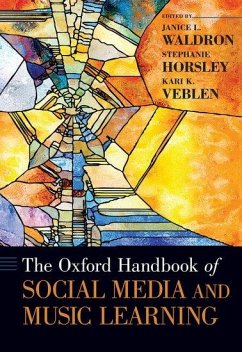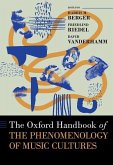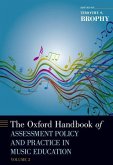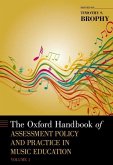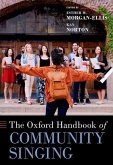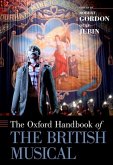The Oxford Handbook of Social Media and Music Learning
Herausgeber: Waldron, Janice L; Veblen, Kari K; Horsley, Stephanie
The Oxford Handbook of Social Media and Music Learning
Herausgeber: Waldron, Janice L; Veblen, Kari K; Horsley, Stephanie
- Gebundenes Buch
- Merkliste
- Auf die Merkliste
- Bewerten Bewerten
- Teilen
- Produkt teilen
- Produkterinnerung
- Produkterinnerung
The Oxford Handbook of Social Media and Music Learning provides fascinating insights into the ways in which social media, musical participation, and musical learning are increasingly entwined.
Andere Kunden interessierten sich auch für
![The Oxford Handbook of Asian Philosophies in Music Education The Oxford Handbook of Asian Philosophies in Music Education]() The Oxford Handbook of Asian Philosophies in Music Education211,99 €
The Oxford Handbook of Asian Philosophies in Music Education211,99 €![The Oxford Handbook of the Phenomenology of Music Cultures The Oxford Handbook of the Phenomenology of Music Cultures]() The Oxford Handbook of the Phenomenology of Music Cultures207,99 €
The Oxford Handbook of the Phenomenology of Music Cultures207,99 €![The Oxford Handbook of Assessment Policy and Practice in Music Education, Volume 2 The Oxford Handbook of Assessment Policy and Practice in Music Education, Volume 2]() The Oxford Handbook of Assessment Policy and Practice in Music Education, Volume 2238,99 €
The Oxford Handbook of Assessment Policy and Practice in Music Education, Volume 2238,99 €![Oxford Handbook of Assessment Policy and Practice in Music Education, Volume 1 Oxford Handbook of Assessment Policy and Practice in Music Education, Volume 1]() Oxford Handbook of Assessment Policy and Practice in Music Education, Volume 1237,99 €
Oxford Handbook of Assessment Policy and Practice in Music Education, Volume 1237,99 €![The Oxford Handbook of Community Singing The Oxford Handbook of Community Singing]() The Oxford Handbook of Community Singing277,99 €
The Oxford Handbook of Community Singing277,99 €![The Oxford Handbook of Faust in Music The Oxford Handbook of Faust in Music]() The Oxford Handbook of Faust in Music204,99 €
The Oxford Handbook of Faust in Music204,99 €![Oxford Handbook of the British Musical Oxford Handbook of the British Musical]() Oxford Handbook of the British Musical258,99 €
Oxford Handbook of the British Musical258,99 €-
-
-
The Oxford Handbook of Social Media and Music Learning provides fascinating insights into the ways in which social media, musical participation, and musical learning are increasingly entwined.
Hinweis: Dieser Artikel kann nur an eine deutsche Lieferadresse ausgeliefert werden.
Hinweis: Dieser Artikel kann nur an eine deutsche Lieferadresse ausgeliefert werden.
Produktdetails
- Produktdetails
- Verlag: Oxford University Press
- Seitenzahl: 760
- Erscheinungstermin: 7. Oktober 2020
- Englisch
- Abmessung: 251mm x 179mm x 42mm
- Gewicht: 1380g
- ISBN-13: 9780190660772
- ISBN-10: 0190660775
- Artikelnr.: 58411058
- Herstellerkennzeichnung
- Libri GmbH
- Europaallee 1
- 36244 Bad Hersfeld
- 06621 890
- Verlag: Oxford University Press
- Seitenzahl: 760
- Erscheinungstermin: 7. Oktober 2020
- Englisch
- Abmessung: 251mm x 179mm x 42mm
- Gewicht: 1380g
- ISBN-13: 9780190660772
- ISBN-10: 0190660775
- Artikelnr.: 58411058
- Herstellerkennzeichnung
- Libri GmbH
- Europaallee 1
- 36244 Bad Hersfeld
- 06621 890
Janice L. Waldron is Associate Professor of music education at the University of Windsor, Windsor, Canada with research interests in informal music learning practices, online music communities, social media and music learning, vernacular musics, and participatory cultures. Published in Music Education Research, The International Journal of Music Education, Action, Criticism, and Theory in Music Education, The Journal of Music, Education, and Technology and The Philosophy of Music Education Review, Dr. Waldron also has authored several Oxford Handbook chapters in its Music Education series. She serves on the editorial boards of Action, Theory, and Criticism in Music Education, The International Journal of Music Education, The Journal of Music, Education, and Technology, and T.O.P.I.C.S. Stephanie Horsley is Acting Associate Director, eLearning at the Centre for Teaching and Learning at Western University, Canada, where she is also Adjunct Assistant Professor of music education in the Don Wright Faculty of Music. Her research interests include music education policy, democratizing access to sites of music education, and "fringe" musical learning spaces. Her latest publications include chapters in The Oxford Handbook of Social Justice and Music Education and Policy and the Political Life of the Music Educator. Her work has been presented at various international conferences. Kari K. Veblen is Professor Emerita of Music Education, Western University in Canada where she teaches cultural perspectives, music for children, and graduate research methods. Thus far her career spans four decades of work as: an elementary public school music teacher, community musician, faculty member at University of Wisconsin-Stevens Point, curriculum consultant to orchestras and schools, visiting scholar at University of Toronto, and research associate at University of Limerick. Veblen has served in numerous professional capacities, including the International Society for Music Education board, and as co-founder and now board member of the International Journal of Community Music. Author and co-author of five books and 90 peer-reviewed works, Veblen's research interests include community music networks, lifespan music learning, traditional transmission, vernacular genres, interdisciplinary curriculum, musical play, and social media and music learning.
* Foreword
* Huib Schippers
* Introduction
* Why Should We Care About Social Media?
* Janice L. Waldron, Stephanie Horsley, and Kari K.Veblen
* Part I. Community Identity and Social Media
* 1. Social Media and Theoretical Approaches to Music Learning in
Networked Communities
* Janice L. Waldron
* 2. Envisioning Pedagogical Possibilities of Social Media and Sonic
Participatory Cultures
* Evan S. Tobias
* 3. Application of Affinity Space Characteristics in Music Education
* Jared O'Leary
* 4. Creating Multiple Sites of Engagement for Music Learning
* Jonathan Savage
* Reflections from the Field of New Media and Sociology: Networked
Music Learning
* Somrita Ganchoudhuri and Barry Wellman
* 5. Diaspora, Transnational Networks, and Socially-Mediated Musical
Belonging
* John O'Flynn
* Part II: Convergent Music Making and Social Media
* 6. 21st-Century Implications for Media Literacy and Music Education
* Daniel A. Walzer
* 7. Online Collaboration in Supporting Music Teaching and Learning
* Radio Cremata and Bryan Powell
* 8. Swedish Hip-Hop Youth Association "The Movement" Goes Online
* Alexandra Söderman and Johan Söderman
* 9. The Disquiet Junto as an Online Community of Practice
* Ethan Hein
* Reports From the Field: Genres of Classical Music
* 10. Building a New Social Contract for Community Engagement Through
Music Virtual Hangouts
* Patrick Schmidt
* 11. The Multiple Affordances of Social Media for Classical Composers
* Heidi Partti
* Reports From the Field: Genres of Popular Music
* 12. Confessions of a Facebook Punk or How Not To Do Social Media
* Gareth Dylan Smith
* 13. Learning to Play the Guitar with the Novaxe Online Learning
Platform
* Anne-Marie Burns and Caroline Traube
* Reports From the Field: Supportive Networks
* 14. Connect Resound as a Support for Music Making in Rural England
* Andrew King, Helen M. Prior, and Caroline Waddington-Jones
* 15. "Vini Ansanm" Come Together for Inclusive Community Music
Development in Port Au Prince, Haiti Gertrude Bien-Aime
* Donald DeVito, Hannah Ehrli, and Jamie Schumacher
* Part III: Musical Identity and Social Media
* 16. Feminist Cyber-Artivism, Musicing, and Teaching and Learning
* Marissa Silverman
* 17. A Content Analysis of Creating and Curating a Musical Identity on
Social Media
* Julie Derges Kastner
* 18. Cultivating Meaningful Personal Learning Networks in an Era of
Multimodal and Globalized Music Learning and Education
* Deanna C. C. Peluso
* 19. Musical (Dis)Empowerment in the Digital Age?
* Ketil Thorgersen
* 20. Learning by Lip-Synching
* Patricia G. Lange
* 21. Fanception and Musical Fan Activity on YouTube
* Christopher Cayari
* Reflections from the Field of Communications and Anthropology:
* Learning to Dream and Dreaming to Learn
* Patricia G. Lange
* Part IV: Continuity and Change in Teaching and Learning Through
Social Media
* 22. Social and Informational Affordances of Social Media in Music
Learning and Teaching
* Anabel Quan-Haase
* 23. "Tradition," Vernacularism, and Learning to be a Folk Musician
with Social Media
* Simon Keegan-Phipps and Lucy Wright
* 24. Ethnomusicology, Music Education, and the Power and Limitations
of Social Media
* David G. Hebert and Sean Williams
* 25. New Materiality and Young People's Connectedness Across Online
and Offline Life Spaces
* Susan O'Neill
* Reflections from the Field of Communications:
* Weird Materiality
* Jeremy Hunsinger
* 26. Learning from Japanese Vocaloid Hatsune Miku
* Matthew D. Thibeault and Koji Matsunobu
* 27. Children's Musical Play in a Digital Era
* Kari K. Veblen and Nathan B. Kruse
* Part V: Provocations and Social Media
* 28. Social Media, Social Justice, and Music Learning
* Joseph Abramo
* 29. Can the Disabled Musician Sing? Songs, Stories, and Identities of
Disabled Persons In/Through/With Social Media
* adam patrick bell and Jesse Rathgeber
* 30. Nurturing Vulnerability to Develop Pedagogical Change Through
MOOC Participation and Public Blogging
* James Humberstone, Catherine Zhao, and Danny Liu
* 31. The Good, The Bad, and The Ugly of Social Media in Music
Education
* Vincent C. Bates and Daniel J. Shevock
* 32. Educating Musical Prosumers for the Economic Conditions of the
21st Century
* Lauri Väkavä
* 33. Creativity and Commerce in Social Media, Digital Technology and
Music Education
* David Lines
* Afterword
* Janice L. Waldron, Stephanie Horsley, and Kari K. Veblen
* Huib Schippers
* Introduction
* Why Should We Care About Social Media?
* Janice L. Waldron, Stephanie Horsley, and Kari K.Veblen
* Part I. Community Identity and Social Media
* 1. Social Media and Theoretical Approaches to Music Learning in
Networked Communities
* Janice L. Waldron
* 2. Envisioning Pedagogical Possibilities of Social Media and Sonic
Participatory Cultures
* Evan S. Tobias
* 3. Application of Affinity Space Characteristics in Music Education
* Jared O'Leary
* 4. Creating Multiple Sites of Engagement for Music Learning
* Jonathan Savage
* Reflections from the Field of New Media and Sociology: Networked
Music Learning
* Somrita Ganchoudhuri and Barry Wellman
* 5. Diaspora, Transnational Networks, and Socially-Mediated Musical
Belonging
* John O'Flynn
* Part II: Convergent Music Making and Social Media
* 6. 21st-Century Implications for Media Literacy and Music Education
* Daniel A. Walzer
* 7. Online Collaboration in Supporting Music Teaching and Learning
* Radio Cremata and Bryan Powell
* 8. Swedish Hip-Hop Youth Association "The Movement" Goes Online
* Alexandra Söderman and Johan Söderman
* 9. The Disquiet Junto as an Online Community of Practice
* Ethan Hein
* Reports From the Field: Genres of Classical Music
* 10. Building a New Social Contract for Community Engagement Through
Music Virtual Hangouts
* Patrick Schmidt
* 11. The Multiple Affordances of Social Media for Classical Composers
* Heidi Partti
* Reports From the Field: Genres of Popular Music
* 12. Confessions of a Facebook Punk or How Not To Do Social Media
* Gareth Dylan Smith
* 13. Learning to Play the Guitar with the Novaxe Online Learning
Platform
* Anne-Marie Burns and Caroline Traube
* Reports From the Field: Supportive Networks
* 14. Connect Resound as a Support for Music Making in Rural England
* Andrew King, Helen M. Prior, and Caroline Waddington-Jones
* 15. "Vini Ansanm" Come Together for Inclusive Community Music
Development in Port Au Prince, Haiti Gertrude Bien-Aime
* Donald DeVito, Hannah Ehrli, and Jamie Schumacher
* Part III: Musical Identity and Social Media
* 16. Feminist Cyber-Artivism, Musicing, and Teaching and Learning
* Marissa Silverman
* 17. A Content Analysis of Creating and Curating a Musical Identity on
Social Media
* Julie Derges Kastner
* 18. Cultivating Meaningful Personal Learning Networks in an Era of
Multimodal and Globalized Music Learning and Education
* Deanna C. C. Peluso
* 19. Musical (Dis)Empowerment in the Digital Age?
* Ketil Thorgersen
* 20. Learning by Lip-Synching
* Patricia G. Lange
* 21. Fanception and Musical Fan Activity on YouTube
* Christopher Cayari
* Reflections from the Field of Communications and Anthropology:
* Learning to Dream and Dreaming to Learn
* Patricia G. Lange
* Part IV: Continuity and Change in Teaching and Learning Through
Social Media
* 22. Social and Informational Affordances of Social Media in Music
Learning and Teaching
* Anabel Quan-Haase
* 23. "Tradition," Vernacularism, and Learning to be a Folk Musician
with Social Media
* Simon Keegan-Phipps and Lucy Wright
* 24. Ethnomusicology, Music Education, and the Power and Limitations
of Social Media
* David G. Hebert and Sean Williams
* 25. New Materiality and Young People's Connectedness Across Online
and Offline Life Spaces
* Susan O'Neill
* Reflections from the Field of Communications:
* Weird Materiality
* Jeremy Hunsinger
* 26. Learning from Japanese Vocaloid Hatsune Miku
* Matthew D. Thibeault and Koji Matsunobu
* 27. Children's Musical Play in a Digital Era
* Kari K. Veblen and Nathan B. Kruse
* Part V: Provocations and Social Media
* 28. Social Media, Social Justice, and Music Learning
* Joseph Abramo
* 29. Can the Disabled Musician Sing? Songs, Stories, and Identities of
Disabled Persons In/Through/With Social Media
* adam patrick bell and Jesse Rathgeber
* 30. Nurturing Vulnerability to Develop Pedagogical Change Through
MOOC Participation and Public Blogging
* James Humberstone, Catherine Zhao, and Danny Liu
* 31. The Good, The Bad, and The Ugly of Social Media in Music
Education
* Vincent C. Bates and Daniel J. Shevock
* 32. Educating Musical Prosumers for the Economic Conditions of the
21st Century
* Lauri Väkavä
* 33. Creativity and Commerce in Social Media, Digital Technology and
Music Education
* David Lines
* Afterword
* Janice L. Waldron, Stephanie Horsley, and Kari K. Veblen
* Foreword
* Huib Schippers
* Introduction
* Why Should We Care About Social Media?
* Janice L. Waldron, Stephanie Horsley, and Kari K.Veblen
* Part I. Community Identity and Social Media
* 1. Social Media and Theoretical Approaches to Music Learning in
Networked Communities
* Janice L. Waldron
* 2. Envisioning Pedagogical Possibilities of Social Media and Sonic
Participatory Cultures
* Evan S. Tobias
* 3. Application of Affinity Space Characteristics in Music Education
* Jared O'Leary
* 4. Creating Multiple Sites of Engagement for Music Learning
* Jonathan Savage
* Reflections from the Field of New Media and Sociology: Networked
Music Learning
* Somrita Ganchoudhuri and Barry Wellman
* 5. Diaspora, Transnational Networks, and Socially-Mediated Musical
Belonging
* John O'Flynn
* Part II: Convergent Music Making and Social Media
* 6. 21st-Century Implications for Media Literacy and Music Education
* Daniel A. Walzer
* 7. Online Collaboration in Supporting Music Teaching and Learning
* Radio Cremata and Bryan Powell
* 8. Swedish Hip-Hop Youth Association "The Movement" Goes Online
* Alexandra Söderman and Johan Söderman
* 9. The Disquiet Junto as an Online Community of Practice
* Ethan Hein
* Reports From the Field: Genres of Classical Music
* 10. Building a New Social Contract for Community Engagement Through
Music Virtual Hangouts
* Patrick Schmidt
* 11. The Multiple Affordances of Social Media for Classical Composers
* Heidi Partti
* Reports From the Field: Genres of Popular Music
* 12. Confessions of a Facebook Punk or How Not To Do Social Media
* Gareth Dylan Smith
* 13. Learning to Play the Guitar with the Novaxe Online Learning
Platform
* Anne-Marie Burns and Caroline Traube
* Reports From the Field: Supportive Networks
* 14. Connect Resound as a Support for Music Making in Rural England
* Andrew King, Helen M. Prior, and Caroline Waddington-Jones
* 15. "Vini Ansanm" Come Together for Inclusive Community Music
Development in Port Au Prince, Haiti Gertrude Bien-Aime
* Donald DeVito, Hannah Ehrli, and Jamie Schumacher
* Part III: Musical Identity and Social Media
* 16. Feminist Cyber-Artivism, Musicing, and Teaching and Learning
* Marissa Silverman
* 17. A Content Analysis of Creating and Curating a Musical Identity on
Social Media
* Julie Derges Kastner
* 18. Cultivating Meaningful Personal Learning Networks in an Era of
Multimodal and Globalized Music Learning and Education
* Deanna C. C. Peluso
* 19. Musical (Dis)Empowerment in the Digital Age?
* Ketil Thorgersen
* 20. Learning by Lip-Synching
* Patricia G. Lange
* 21. Fanception and Musical Fan Activity on YouTube
* Christopher Cayari
* Reflections from the Field of Communications and Anthropology:
* Learning to Dream and Dreaming to Learn
* Patricia G. Lange
* Part IV: Continuity and Change in Teaching and Learning Through
Social Media
* 22. Social and Informational Affordances of Social Media in Music
Learning and Teaching
* Anabel Quan-Haase
* 23. "Tradition," Vernacularism, and Learning to be a Folk Musician
with Social Media
* Simon Keegan-Phipps and Lucy Wright
* 24. Ethnomusicology, Music Education, and the Power and Limitations
of Social Media
* David G. Hebert and Sean Williams
* 25. New Materiality and Young People's Connectedness Across Online
and Offline Life Spaces
* Susan O'Neill
* Reflections from the Field of Communications:
* Weird Materiality
* Jeremy Hunsinger
* 26. Learning from Japanese Vocaloid Hatsune Miku
* Matthew D. Thibeault and Koji Matsunobu
* 27. Children's Musical Play in a Digital Era
* Kari K. Veblen and Nathan B. Kruse
* Part V: Provocations and Social Media
* 28. Social Media, Social Justice, and Music Learning
* Joseph Abramo
* 29. Can the Disabled Musician Sing? Songs, Stories, and Identities of
Disabled Persons In/Through/With Social Media
* adam patrick bell and Jesse Rathgeber
* 30. Nurturing Vulnerability to Develop Pedagogical Change Through
MOOC Participation and Public Blogging
* James Humberstone, Catherine Zhao, and Danny Liu
* 31. The Good, The Bad, and The Ugly of Social Media in Music
Education
* Vincent C. Bates and Daniel J. Shevock
* 32. Educating Musical Prosumers for the Economic Conditions of the
21st Century
* Lauri Väkavä
* 33. Creativity and Commerce in Social Media, Digital Technology and
Music Education
* David Lines
* Afterword
* Janice L. Waldron, Stephanie Horsley, and Kari K. Veblen
* Huib Schippers
* Introduction
* Why Should We Care About Social Media?
* Janice L. Waldron, Stephanie Horsley, and Kari K.Veblen
* Part I. Community Identity and Social Media
* 1. Social Media and Theoretical Approaches to Music Learning in
Networked Communities
* Janice L. Waldron
* 2. Envisioning Pedagogical Possibilities of Social Media and Sonic
Participatory Cultures
* Evan S. Tobias
* 3. Application of Affinity Space Characteristics in Music Education
* Jared O'Leary
* 4. Creating Multiple Sites of Engagement for Music Learning
* Jonathan Savage
* Reflections from the Field of New Media and Sociology: Networked
Music Learning
* Somrita Ganchoudhuri and Barry Wellman
* 5. Diaspora, Transnational Networks, and Socially-Mediated Musical
Belonging
* John O'Flynn
* Part II: Convergent Music Making and Social Media
* 6. 21st-Century Implications for Media Literacy and Music Education
* Daniel A. Walzer
* 7. Online Collaboration in Supporting Music Teaching and Learning
* Radio Cremata and Bryan Powell
* 8. Swedish Hip-Hop Youth Association "The Movement" Goes Online
* Alexandra Söderman and Johan Söderman
* 9. The Disquiet Junto as an Online Community of Practice
* Ethan Hein
* Reports From the Field: Genres of Classical Music
* 10. Building a New Social Contract for Community Engagement Through
Music Virtual Hangouts
* Patrick Schmidt
* 11. The Multiple Affordances of Social Media for Classical Composers
* Heidi Partti
* Reports From the Field: Genres of Popular Music
* 12. Confessions of a Facebook Punk or How Not To Do Social Media
* Gareth Dylan Smith
* 13. Learning to Play the Guitar with the Novaxe Online Learning
Platform
* Anne-Marie Burns and Caroline Traube
* Reports From the Field: Supportive Networks
* 14. Connect Resound as a Support for Music Making in Rural England
* Andrew King, Helen M. Prior, and Caroline Waddington-Jones
* 15. "Vini Ansanm" Come Together for Inclusive Community Music
Development in Port Au Prince, Haiti Gertrude Bien-Aime
* Donald DeVito, Hannah Ehrli, and Jamie Schumacher
* Part III: Musical Identity and Social Media
* 16. Feminist Cyber-Artivism, Musicing, and Teaching and Learning
* Marissa Silverman
* 17. A Content Analysis of Creating and Curating a Musical Identity on
Social Media
* Julie Derges Kastner
* 18. Cultivating Meaningful Personal Learning Networks in an Era of
Multimodal and Globalized Music Learning and Education
* Deanna C. C. Peluso
* 19. Musical (Dis)Empowerment in the Digital Age?
* Ketil Thorgersen
* 20. Learning by Lip-Synching
* Patricia G. Lange
* 21. Fanception and Musical Fan Activity on YouTube
* Christopher Cayari
* Reflections from the Field of Communications and Anthropology:
* Learning to Dream and Dreaming to Learn
* Patricia G. Lange
* Part IV: Continuity and Change in Teaching and Learning Through
Social Media
* 22. Social and Informational Affordances of Social Media in Music
Learning and Teaching
* Anabel Quan-Haase
* 23. "Tradition," Vernacularism, and Learning to be a Folk Musician
with Social Media
* Simon Keegan-Phipps and Lucy Wright
* 24. Ethnomusicology, Music Education, and the Power and Limitations
of Social Media
* David G. Hebert and Sean Williams
* 25. New Materiality and Young People's Connectedness Across Online
and Offline Life Spaces
* Susan O'Neill
* Reflections from the Field of Communications:
* Weird Materiality
* Jeremy Hunsinger
* 26. Learning from Japanese Vocaloid Hatsune Miku
* Matthew D. Thibeault and Koji Matsunobu
* 27. Children's Musical Play in a Digital Era
* Kari K. Veblen and Nathan B. Kruse
* Part V: Provocations and Social Media
* 28. Social Media, Social Justice, and Music Learning
* Joseph Abramo
* 29. Can the Disabled Musician Sing? Songs, Stories, and Identities of
Disabled Persons In/Through/With Social Media
* adam patrick bell and Jesse Rathgeber
* 30. Nurturing Vulnerability to Develop Pedagogical Change Through
MOOC Participation and Public Blogging
* James Humberstone, Catherine Zhao, and Danny Liu
* 31. The Good, The Bad, and The Ugly of Social Media in Music
Education
* Vincent C. Bates and Daniel J. Shevock
* 32. Educating Musical Prosumers for the Economic Conditions of the
21st Century
* Lauri Väkavä
* 33. Creativity and Commerce in Social Media, Digital Technology and
Music Education
* David Lines
* Afterword
* Janice L. Waldron, Stephanie Horsley, and Kari K. Veblen

